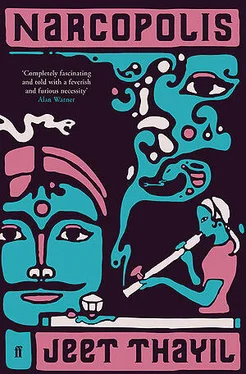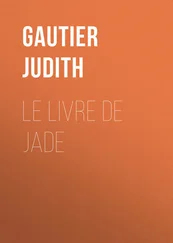Jeet Thayil - Narcopolis
Здесь есть возможность читать онлайн «Jeet Thayil - Narcopolis» весь текст электронной книги совершенно бесплатно (целиком полную версию без сокращений). В некоторых случаях можно слушать аудио, скачать через торрент в формате fb2 и присутствует краткое содержание. Год выпуска: 2012, Издательство: Faber & Faber, Жанр: Современная проза, на итальянском языке. Описание произведения, (предисловие) а так же отзывы посетителей доступны на портале библиотеки ЛибКат.
- Название:Narcopolis
- Автор:
- Издательство:Faber & Faber
- Жанр:
- Год:2012
- ISBN:нет данных
- Рейтинг книги:3 / 5. Голосов: 1
-
Избранное:Добавить в избранное
- Отзывы:
-
Ваша оценка:
- 60
- 1
- 2
- 3
- 4
- 5
Narcopolis: краткое содержание, описание и аннотация
Предлагаем к чтению аннотацию, описание, краткое содержание или предисловие (зависит от того, что написал сам автор книги «Narcopolis»). Если вы не нашли необходимую информацию о книге — напишите в комментариях, мы постараемся отыскать её.
Outside, stray dogs lope in packs. Street vendors hustle. Hookers call for custom through the bars of their cages as their pimps slouch in doorways in the half-light. There is an underworld whisper of a new terror: the Pathar Maar, the stone killer, whose victims are the nameless, invisible poor. There are too many of them to count in this broken city.
Narcopolis
Narcopolis — читать онлайн бесплатно полную книгу (весь текст) целиком
Ниже представлен текст книги, разбитый по страницам. Система сохранения места последней прочитанной страницы, позволяет с удобством читать онлайн бесплатно книгу «Narcopolis», без необходимости каждый раз заново искать на чём Вы остановились. Поставьте закладку, и сможете в любой момент перейти на страницу, на которой закончили чтение.
Интервал:
Закладка:
*
Rumi told the story the way he drove on the freeways of California, on autopilot, his mind half elsewhere. Where exactly? What was he thinking about when he talked about the opera singer? His mind was not in the air with the high voice that was trying to reach the ears of God, but down to earth below, on a pair of cowboy boots, to be specific, a pair of ostrich Tony Lamas, the most beautiful pair he’d owned and he’d owned a few. The opera singer asked him to stop at a diner, she needed food or her blood sugar would spike. They stopped at a twenty-four-hour place, toast, eggs and beer for him, poached eggs for her, with bacon and coffee. The restaurant had framed photos of dead musicians on the walls, but only if they died when they were young; musicians who died of natural causes at a ripe old age were not similarly honoured. Rumi was surprised at how many photos there were, how many musicians in how many genres. After breakfast, she got in front with him and curled up on the bench seat and put her head on his shoulder. He took her to Mulholland Drive, where she told him to wait in the car. He couldn’t come up. He waited, he found news on the radio, then a rock station, except the music wasn’t rock exactly, it was some kind of chant, a robotic voice saying something about corpses rotting in the red alleys of the moon, giving up their flesh to the cat-sized rats that came out to feed when the dog-sized cats had fed their fill and gone. When the song ended, the singer put her head in the window and gave him the boots. Whose are they? he asked. A friend’s, she said, a friend who died. I want you to have them. Rumi didn’t want a dead man’s boots, but when he tried them on they fit like they’d been handcrafted specially for him. He never mentioned this part when he told the story about driving the opera singer around the hills of Los Angeles: he kept the boots to himself.
*
Dimple’s new life at Safer was governed by the clock. They gave her a complete medical at Holy Family Hospital. The hole in her chin was not dangerous, the doctors told her, at least not at the moment. It was better to wait and see what happened, but first she had to detox. The staff at Safer put her on chlorpromazine, available on the street under the brand name of Largactil, and it was months later that she discovered how controversial the drug was, and dangerous, because it was still experimental. But she did what she was told, she took the pills they gave her and tried to live through detox. The chlorpromazine made her hallucinate so heavily that she wasn’t aware of the torment her body was enduring, the pain, the panic and diarrhoea, because she was tripping. Four or five days after she started on the drug, when the worst of the withdrawals had passed, they took her off it. For two weeks her bowels were loose and for a month she didn’t sleep, not at all, she lay awake on the turkey mattress and waited for dawn. The centre was on the top floor of the church premises and from the roof she heard the birds at four in the morning. Then the sky lightened and the others woke and the day began. At six there was a yoga class. All turkeys had to attend, one of the other inmates told her; it was compulsory. Yoga was followed by breakfast: two fried eggs, two pieces of toast, jam, butter and milk tea. Then the morning’s physical therapy session began, an hour and a half of sweeping and swabbing. Once a week they swept out the church in which the centre was located, Mount Carmel’s, where the yearly Feast of Our Lady of Infinite Sorrow was held. Afterwards, the turkeys showered, or most of them did. The new turkeys who couldn’t stand the touch of water went straight into the morning meeting. There were two house meetings a day, run by those inmates who’d been sober longest. At her first meeting, the guy who was in charge, an older Catholic fellow named Carl, asked her a question. She was still feeling the effects of the chlorpromazine, which made it difficult to lie. The only lie she could keep straight in her head was the lie of her name and gender. So when Carl said, Why do you take drugs? she told him what she thought, told him the truth because the least such a question deserved was a real answer. She said, Oh, who knows, there are so many good reasons and nobody mentions them and the main thing nobody mentions is the comfort of it, how good it is to be a slave to something, the regularity and the habit of addiction, the fact that it’s an antidote to loneliness, and the way it becomes your family, gives you mother love and protection and keeps you safe. Carl, trying to keep to the moral high ground, trying to protect his position as the meeting’s architect, said: But there are good habits and there are bad habits. Drugs are a bad habit, so why do it? Because, said Dimple, it isn’t the heroin that we’re addicted to, it’s the drama of the life, the chaos of it, that’s the real addiction and we never get over it; and because, when you come down to it, the high life, that is, the intoxicated life, is the best of the limited options we are offered — why would we choose anything else? When she looked up she found Carl gazing at her with narrowed eyes, and when he asked her to continue, in a tone of voice that suggested animosity or at least reluctance, she said she was feeling sick and she had nothing more to say.
*
You tell me, the dealer told Rumi, what was she, the singer, pussy or cunt? Cunt, said Rumi, they’re all cunts, and that was when someone rushed into the room, a man so black he could have been African, with a red mouth that smelled of sweat and sewage, and for a moment Rumi thought it was the devil in his natural state, blackened and sooty and looking for company, or the devil freshly returned from the flames of hell, his red mouth about to burst into laughter, but it was Shakoor. He was offering trial hits of some new maal. Free, he said, who wants to go first? The pimp opened his eyes and said, Me, I want to go, and he cooked up and tied off before Rumi had said a word. The pimp stuck the syringe into his ruined veins but couldn’t find any blood and the deeper he dug the more frustrated he became. Shakoor gave Rumi a vial and he spilled a little of the powder on the table top and snorted it up and felt his body go limp and his heart wind down, actually felt his heart expand and seize up and start again. He staggered to the bathroom and put water into his nose and spit out as much of the powder as he could. He threw up and he threw up again and his legs wouldn’t obey him and it was a while before he felt well enough to walk back to the room. Shakoor and the dealer were standing up, close in the small space, looking intently at the unconscious pimp. Get him out of here, said Shakoor. The dealer pulled a gun from under his shirt, a country-made pistol that would almost certainly misfire, though there was a chance it would not, and he pointed it at Rumi and said: Go on, fuck face, get this sisterfucker motherfucker out of here. He followed as Rumi dragged the pimp, first by the arms and then the feet, dragged him out of the khana and onto the road in broad daylight. See you, cunt, said the dealer as he walked back to Shakoor’s. Rumi, dry heaving and sick, put the pimp on the road and passed out or fell asleep. He was woken by a skinny constable, low caste or no caste, probably a chamar, who put him in a van and told him the pimp was dead and he could be dead too. And the low-caste cop also told him something he knew: he was in a lot of trouble.
*
Carl asked if she would take a session at the centre the following week. She could do whatever she liked, pick a topic like pride, say, or faith, or she could discuss a book, Anthony De Mello’s great work Prayer of the Frog , for example, or hold a study class of some sort. She was still shaky from the withdrawal medications, the chlorpromazine and Avil; she felt like she was shedding skin, not dead skin but living skin, and her flesh felt raw and chafed. Then Carl asked what kind of class she would take, what subject, and the answer popped into her head almost as soon as she heard his question: she would teach history, she said, a history of evil as suggested by certain individuals, obscure and not, including but not limited to poets, priests and prostitutes. Carl started to shake his head before she had finished speaking. Inappropriate, misdirected and overcompensation were some of the words he used, and there were others too, but they were not as interesting. Carl thought the kind of session she had in mind was more suited to a university or some kind of arty lecture series. There was nothing uplifting about it, so how would it benefit a group of recovering addicts whose hold on sobriety, not to mention reality, was shaky enough to begin with? She agreed that there was nothing uplifting about the subject, or nothing obviously uplifting, but it would certainly benefit those in recovery, since addiction was one of the fringe topics that fell under the general heading of evil, and she wanted to talk about the ideas of Burroughs, Baudelaire, Cocteau and de Quincey, to name only four historians of evil, though the last named was a cusp case. Who are they, Carl asked, poets and prostitutes? Writers, said Dimple. Carl asked if they all took drugs. Yes, said Dimple, they did, opiates mostly. Well then, they’re junkies plain and simple, fuck-ups who got lucky; they were not to be trusted. And besides, said Carl, they’re not the kind of positive thinkers we prefer to focus on at the centre. This programme is aimed at getting people off heroin, not glamorizing it.
Читать дальшеИнтервал:
Закладка:
Похожие книги на «Narcopolis»
Представляем Вашему вниманию похожие книги на «Narcopolis» списком для выбора. Мы отобрали схожую по названию и смыслу литературу в надежде предоставить читателям больше вариантов отыскать новые, интересные, ещё непрочитанные произведения.
Обсуждение, отзывы о книге «Narcopolis» и просто собственные мнения читателей. Оставьте ваши комментарии, напишите, что Вы думаете о произведении, его смысле или главных героях. Укажите что конкретно понравилось, а что нет, и почему Вы так считаете.












